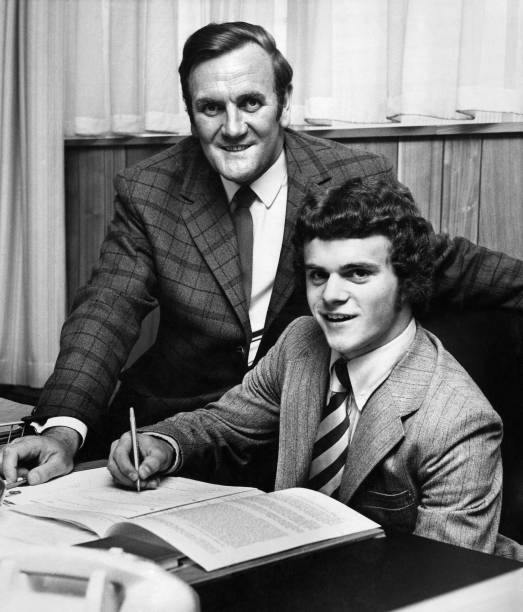 |
 |
 |
 |
 |
 |
 |
 |
 |
 |
 |
Players
David
McNiven (striker) 1972-78
Standing just 5ft 6in tall and weighing 11st 4lb, McNiven was known for
his agility and ability to find holes in the tightest of defences, while
his ability to make an impact when he came off the bench saw him nicknamed
'Supersub'. David Scott McNiven was born on 9 September 1955, in Stonehouse, Scotland.
From a young age, McNiven showed a keen interest in football, a passion
that would shape his future. His early years were spent honing his skills
on local pitches, where his talent as a forward quickly became evident. His skills caught the attention of scouts, and in 1971, McNiven joined
Leeds United, marking the beginning of his professional career. The 1975/76 season saw McNiven begin to make his mark at senior level.
McNiven was a prolific goalscorer in the Juniors and Reserves, scoring
three hat-tricks in the Central League. Jimmy Armfield gave McNiven his
first-team debut on 8 October 1975, in a League Cup-tie against Notts
County at Elland Road. He went on to make a couple of substitute appearances
towards the end of the season, scoring in his first league game, a 2-1
victory against Manchester City on 17 April. His real breakthrough came the following campaign when McNiven made 18
league appearances, scoring 5 goals. His increased involvement was a testament
to his hard work and determination. McNivenís ability to come off the
bench and make an impact continued to be a valuable asset for Leeds United. His finest moment caame on 23 October 1976 when he scored an 89th minute
equaliser against Liverpool at Elland Road to rescure a point against
the reigning champions. While McNiven's first-team opportunities were limited, this was understandable
given the competition at one of the country's finest clubs. The team boasted
several wonderful forwards, including Allan Clarke, Peter Lorimer and
Joe Jordon, and breaking into the first team required exceptional performances
or great fortune. McNivenís perseverance and dedication were evident as he continued to
work hard in training and make the most of his opportunities. His time
at Leeds United was a learning experience, helping him develop the resilience
and skills needed for a successful football career. In February 1978, McNiven transferred to Third Division Bradford City
in a £25,000 deal, widely considered as a snip. This move marked
a significant period in his career, as he became a key player for the
team, though he couldn't help the Bantams avoid relegation at the end
of teh season. Over the next five years, McNiven made 212 league appearances
and scored 64 goals for Bradford City. His performance on the field was
instrumental in many of the teamís successes during this period. McNivenís
ability to find the back of the net made him a fan favourite and a crucial
part of the squad. After leaving Bradford City in 1983, McNiven joined Blackpool. His debut
for Blackpool was memorable, as he scored the only goal in a victory over
Rochdale. McNiven continued to be a reliable forward for Blackpool, making
49 appearances and scoring 11 goals during his time with the club. His
contributions helped Blackpool navigate through challenging seasons, and
his experience was invaluable to the team. In 1985, McNiven had a brief stint with the Pittsburgh Spirit, an indoor
soccer team in the United States. This move was part of his exploration
of opportunities outside the UK. Later that year, he returned to England
to play for Halifax Town, where he made 12 appearances and scored 4 goals.
Although his time at Halifax was short, it added another chapter to his
diverse playing career. McNiven ended his playing career with a spell
at Morecambe. In addition to his club career, McNiven also had the honour of representing
Scotland at the under-21 level. He earned three caps for the Scotland
Under-21 team, scoring one goal. This experience highlighted his talent
and provided him with the opportunity to compete at a higher level of
football. After retiring from professional football, McNiven transitioned into
various roles outside the sport. Initially, he worked as a milkman in
St Annes, a job that kept him connected to the community. Later, he ventured
into the automotive industry, becoming a second-hand car salesman in Preston.
His ability to connect with people and his dedication to his work helped
him succeed in this new career. Eventually, McNiven advanced to the position
of commercial sales manager, a role that allowed him to utilise his leadership
skills and business acumen. His post-football career demonstrated his
versatility and ability to adapt to new challenges. McNivenís legacy extends beyond his own career. His sons, David and Scott
McNiven, followed in his footsteps and became professional footballers.
This continuation of the footballing tradition within the McNiven family
is a testament to Davidís influence and the passion for the sport that
he instilled in his children. David
McNivenís time at Leeds United may not have been the most prolific, but
it was undoubtedly significant. It was at Leeds that he transitioned from
a promising young talent to a professional footballer. The experience
and exposure he gained during these years laid the foundation for his
future successes.
David
McNivenís time at Leeds United may not have been the most prolific, but
it was undoubtedly significant. It was at Leeds that he transitioned from
a promising young talent to a professional footballer. The experience
and exposure he gained during these years laid the foundation for his
future successes.